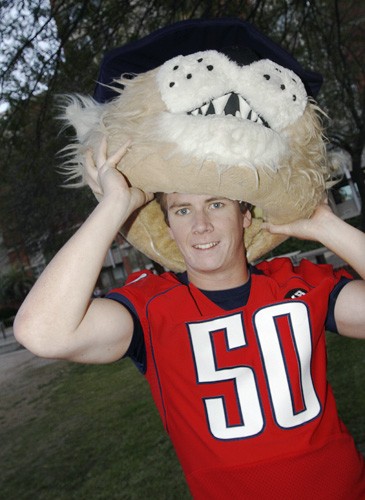Brenton Silbert-Ford is quite a character.
He has been an otter, a turtle, a penguin and, most recognizably, a Wildcat.
For the past two years, Silbert-Ford, a marketing senior, and Camila Guzman, an environmental sciences junior, have portrayed Wilbur and Wilma Wildcat, the UA’s married mascots.
They have been groped, grabbed, kissed and hugged and no one knew who they were. That changed Saturday when the pair was revealed during half time of the season’s final home men’s basketball game.
While both Silbert-Ford and Guzman reveled in their experiences as mascots, the two said it was nice to finally receive some recognition by allowing the world to see the people behind the fur and over-sized heads.
Silbert-Ford was a high school student in San Diego, Calif., when he put on his first mascot suit as a performer at SeaWorld.
“”(The otter’s) character matches Wilbur as a playful character,”” he said. “”You would just add that ego to that otter and you will be Wilbur.””
During his time at the UA, Silbert-Ford became known as the “”good dancing”” Wilbur. He was energetic, he made signs — such as the infamous “”I’m with stupid”” sign which was directed at Arizona State University’s Sparky the Sun Devil — he had props and now he has memories.
While Silbert-Ford came to the UA with a mascot pedigree, Guzman was just looking for a way to get involved and show her school spirit.
Despite their different paths to becoming mascots, Guzman and Silbert-Ford have grown accustomed to one another’s presence.
They finish each other’s sentences, they simultaneously recall the same memories and they have both grown to embody their characters.
Guzman said she laughs like Wilma, taking both hands to cover her face as she hunches forward. Silbert-Ford said he has posed for so many pictures with his arms folded it has become second nature.
“”We can read each other without even thinking,”” Guzman said. “”We don’t need to verbalize what we think. We will just do a weird hand motion and know what we’re talking about.””
Being a mascot is different than being an actor. The characters are left to improvise, have no script and are simply given character traits and told to embody them so the community never sees a change from one mascot to another.
Silbert-Ford said when each performer goes “”in suit”” they bring their own flavor to the character, and elements of that flavor can either become a tradition or they can disappear once the individual’s two-year contract expires.
“”I am a big fan of giant props. I made a lot of giant props this year. I made a giant saw for the tree that didn’t come. For Joe Bruin I made a giant bear trap. For the (NAU) lumberjack a giant ax,”” he said. “”I still have every single one, and of course I have a pitch fork for Sparky.””
Being a mascot is not all fun and games, however, as it takes extreme dedication and amounts to what is essentially volunteer work.
Both Guzman and Silbert-Ford had to pay a $200 annual fee and had to raise an additional $500 in order to be Wilbur and Wilma.
As compensation for their 30-hour un-paid workweeks, they received a $100 book scholarship during their first year and a $200 book scholarship during their second. They also get free Nike clothing and Wilbur gets to travel to away sporting events. Wilma, however, only gets to travel to one away football game per year.
“”For me, the traveling makes up for it. Going to Maui for a week or going to Miami for a week,”” Silbert-Ford said. “”It really kind of evens out, but then you think about it, and all of the other mascots get that stuff and a full ride (scholarship).””
Guzman finished Silbert-Ford’s sentence saying, “”It is a little discouraging sometimes.””
Neither Guzman nor Silbert-Ford will be graduating in May, and both say they won’t know how much they will miss being Wilma and Wilbur until they officially can no longer get “”in suit.””
Silbert-Ford said he has future mascot ambitions after his time as Wilbur is through. In fact, another former Wilbur has been recruiting him to become a professional mascot in the Japanese professional baseball league.
Mascots are not in it for the glory, he said. They anonymously touch the lives of thousands and when their time “”in suit”” ends, all they get are the memories.
“”You sit in class and it’s like ‘I took a picture with you, you gave me a hug, and you don’t even want to talk about what you did,”” Silbert-Ford said. “”You definitely do it for the kids and the super-fans. Not for anyone else.””








